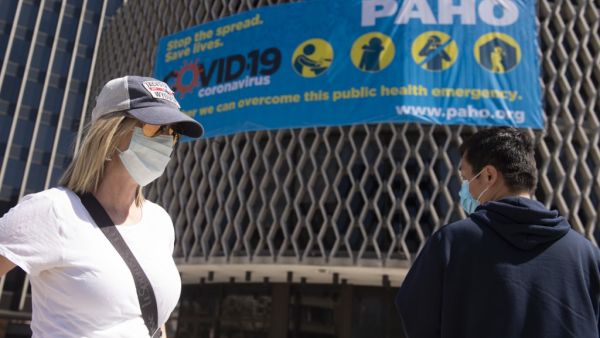The World Health Organization will reconsider its decision to tell healthy people not to wear face masks to protect themselves from the coronavirus.
A recent study found that coughs and sneezes can spread virus particles up to 27ft (8m) in a cloud around an infected patient.
The WHO currently does not recommend that people without the illness wear face masks because there is little evidence they help and they would be better used by healthcare workers and patients who test positive.
But it might be about to change its mind, according to a former infectious disease director at the organisation.
Professor David Heymann, now an in-house expert at the London School of Hygiene & Tropical Medicine, said the WHO was reopening its discussions about masks today.
He said officials could decide to advise people that masks are beneficial - but people would have to wear ones with a proper seal around the nose and wear them all the time.
Professor Heymann said: 'There is right now a debate about the usefulness of masks because Hong Kong has provided some evidence that masks may be useful in protecting individuals from infection. It's not clear yet whether or not that’s true.
'WHO, the group that I work with, is debating that with a group of experts around the world tomorrow, to understand whether there is evidence which would call for a change in what WHO is recommending now for masks.
'[What is recommends] is that they really don’t have a major role in protecting people from infection except in healthcare workers where they also wear eye protection and they also have a role from protecting others from coughs or sneezing.'
He added: 'But as the evidence becomes available, it seems there will be a debate trying to decide whether masks play a role at some point in the outbreak.
'And believe me, if they do, there is a private sector healthy enough to begin producing those masks in quantities necessary.'
He made the comments in a briefing at British think-tank Chatham House in London yesterday.
The WHO currently says healthy people only ought to wear a mask if they're looking after a COVID-19 patient, or if they are coughing and sneezing themselves.
The coronavirus is thought only to spread through close contact with others - defined as being within 6'6" (2m) of someone.
But a study by the Massachusetts Institute of Technology (MIT) in Boston found that infected patients can create a cloud of virus particles around them with coughs and sneezes.
This can stretch out up to 27ft (8m) and could carry enough of the virus to infect someone, the researchers said.
Droplets from people's lungs could also linger in the air and be blown about, they added.
The study - from one of the US's most prestigious universities and published in the Journal of the American Medical Association (JAMA) - was done in lab conditions rather than the real world.
But it could change the way health authorities look at protective equipment like masks, which are currently being stockpiled for health workers.
In France, for example, the government banned wholesalers from selling masks to the public so it could save them for medical staff.
Although scientists say the vast majority of masks do not have fine enough filters to stop viruses getting through, there is a growing school of thought that they could be useful.
Even if they don't stop viruses in their tracks they could redirect air flow which might be carrying them into people's mouths or noses.
A smaller initial dose of the virus has been linked to less severe symptoms in some coronavirus patients.
South Korea, Japan, Singapore and Hong Kong have issued millions of masks to the public and, thanks to strict public health measures, managed to prevent large outbreaks, despite being in such close proximity to China.
Professor Ian Jones, a virologist from the University of Reading, said the mass-issuing of masks 'should now be considered' in the UK.
Warning that the crisis is spiralling rapidly, he told MailOnline: 'Anything that reduces the rate of transmission will bring it under control sooner.'
Professor Jones told MailOnline: 'For me it's very simple, the epidemic is currently running [rampant] and anything that reduces the rate of transmission will bring it under control sooner.
'On the basis that correct mask use would do no harm and potentially some good it should be considered.'
Dr Stephen Griffin, associate professor of infection and immunity at the University of Leeds, said masks prevent people with no symptoms spreading the disease by catching tiny droplets they exhale.
He added: 'They are also useful for people that are themselves symptomatic in stopping coughs and sneezes.
'They also reduce the propensity for people to touch their faces, which happens many more times a day than we all realise and is a major source of infection without proper hand hygiene.'
George Gao, director-general of the Chinese Center for Disease Control and Prevention, this week said the 'big mistake' in the US and Europe was that 'people aren't wearing masks'.
He told Science magazine: 'This virus is transmitted by droplets and close contact. Droplets play a very important role – you've got to wear a mask, because when you speak, there are always droplets coming out of your mouth.
'Many people have asymptomatic or pre-symptomatic infections. If they are wearing face masks, it can prevent droplets that carry the virus from escaping and infecting others.'








